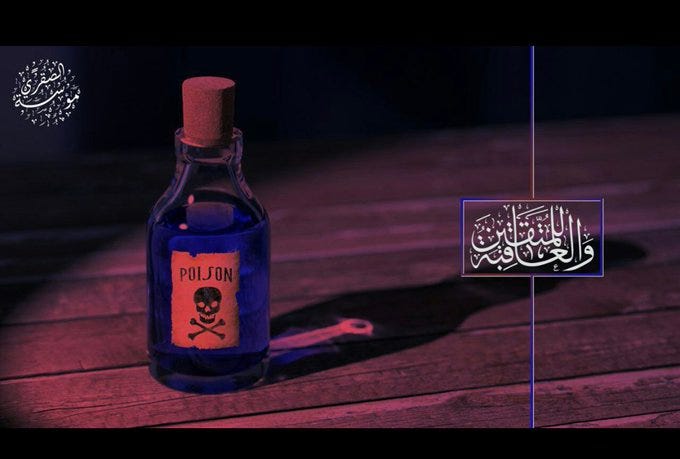Islamic State-Aligned ‘Al-Saqri Foundation for Military Sciences’ Launches New Incitement Campaign with Bomb-Making Manuals
In early February, the pro-Islamic State Al-Saqri Foundation for Military Sciences began its latest push to instruct and incite sympathizers to prepare attacks against the movement’s enemies. Over the past two weeks, the group, which specializes in the production of chemical and biological weapons, has published new bomb-making manuals and booklets providing tactical advice to prospective militants in Arabic and English, disseminating them through messaging application channels, on Telegram in particular.
History of Al-Saqri
Al-Saqri has been operating within the Islamic State propaganda ecosystem since at least 2018 and has a considerable record of encouraging violence and promoting do-it-yourself jihadi materials. The group focuses on providing technical instructions about how to make detonators, bombs, suicide vests and belts, chemical and biological agents (including the use of animal and plant materials), and more.


Speaking on the group’s origins and operating methods, Laith Alkhouri, counterterrorism specialist and CEO of Intelonyx Intelligence Advisory, assesses that:
Al-Saqri Foundation technically emerged in 2018 on the encrypted communications platform Telegram. Its material has been wholly focused on advancing the militant knowledge base of jihadists — releasing a range of militant manuals ranging from IED production to home manufacturing of poisons. The group could have operated under a different name prior to 2018; a number of its material has been relaundered from previously released jihadist manuals. Most of their content are instructional texts and PDFs.
The outlet’s material is sometimes connective, providing details on how to find its channels and contact group members for further information. Al-Saqri’s content has also been translated by other allied organizations such as the Anis Almohadin network.
In 2018, Al-Saqri Foundation for Military Sciences released an e-book on how to take precautionary measures when bomb-making and was involved with the pro-IS ‘Youth of the Caliphate’ magazine. Europol described the print series as being “managed by a consortium of pro-IS media outlets (the Ashhad Media Company, the Sunni Shield Foundation, and al-Saqri Corporation for Military Sciences), and … headed by al-Abd al-Faqir Foundation.”



In addition, they have published manuals on how to create and use deadly gases like hydrogen sulphide, phosphine, and cyanide. In November 2018, Al-Saqri also released a series of guides on how to make detonators for bombs and how to fire a sniper rifle through holes drilled in the trunk of a vehicle, while also putting out a video largely made up of clips from an Islamic Jihad in Gaza production about IED construction.


Al-Saqri continued producing and spreading these types of materials in 2019, publishing a document showing readers how to blind and disrupt CCTVs and camera sensors using laser pointers, offering an “explosives building course”, and releasing “Al-Saqri Military Science Foundation General Magazine”. The organization promoted the use of poison and the spread of viruses/infectious diseases (including anthrax and botulinum toxin), while also encouraging sympathizers to strike oil and gas targets, derail trains, and conduct arson attacks against businesses, residential buildings, factories, and forests.
There have been arrests made in multiple countries reportedly in relation to the possession, creation, and distribution of Al-Saqri’s materials. In 2018, Tunisia detained eight men, accusing them of having links with Al-Saqri and of having ties to the Islamic State in Iraq and Syria. The following year, Turkish police arrested a man who was allegedly involved in the production of Al-Saqri’s instructional publications on bomb-making. Indian security agencies issued an alert in September 2021 in response to Al-Saqri’s release of a book titled ‘The Mobile Bomb’ which tells readers how to build various types of suicide vests.
The Organizational Resiliency of Al-Saqri
Following Abu Bakr al-Baghdadi’s death in October 2019, Islamic State supporters shared links to what has been described by researchers as “one of the largest known online repositories of ISIS material.” The ‘Caliphate Cache’ is a two terabyte self-contained archive of official IS and pro-IS inspirational, ideological, and instructional material. Al-Saqri was a notable contributor to the cache’s latter category with its ‘Archive of Military Science’ and ‘Four Easy Ways’ series.
The network has proven to be highly adaptable in the face of cyber offensives such as Europol’s recent coordinated action against bomb-making manuals available online. Europol has been monitoring Al-Saqri since its early phase, and, in 2018, for instance, the agency called the group one of the “most prominent” pro-IS outlets specializing in “providing instructions on cyber and operational security.”
Moustafa Ayad, the Executive Director for Africa, Middle East and Asia at the Institute for Strategic Dialogue, explained how Al-Saqri is able to constantly overcome such targeted campaigns:
Using channel names that are innocuous or simply a series of numbers or black circles, outlets like al-Saqri can stave off takedowns long enough to not just distribute the content but also create new channels that are accessible for more distribution before a takedown. Takedowns as a tactic may stymie networks for a period of time, but the ecosystem of Islamic State support is not reliant on a single platform. You may disrupt a network on one platform, but as research has shown, the extremist ecosystem online does not rely on a single platform. With a full-court press strategy, Islamic State networks can shift to other platforms only to bounce back.
Ayad adds:
Al-Saqri networks for instance have access to an archive of all their content on a standalone platform that functions as the repository for content so that it’s never lost. If you take down only the front-facing set of distributors (channels, accounts, and pages), the “plug” still exists on the open web. The resource remains. Takedowns, thus, remain a tactic and never move into territory that can be classified as a strategy.
Al-Saqri’s Latest Push
The group continues to persist and operate in the online Islamic State media sphere. Since early February, Al-Saqri has published manuals in Arabic and English on “C4 Plastic Explosive Preparation” and “Mercury Fulminate Preparation.” The network has also released a booklet on how to effectively use disguises, clandestinely plot and carry out attacks, and has posted an Arabic translation of a US Department of Defense counterterrorism handbook.
These materials are being pushed out by Telegram bots and shared in pro-IS channels alongside content from the more recently formed Doat al-Falah media organization. It is unclear if or how Al-Saqri and Doat al-Falah are related, although it is notable that their content is being disseminated by the same sources. The network does have a history of links to other pro-IS outlets such as Al-Battar Media Foundation.
Given Al-Saqri’s proven resiliency, its operational longevity, and its recent surge of activity, it is likely that the group will continue to contribute to the Islamic State cause and play a noticeable role in the online IS propaganda ecosystem.






